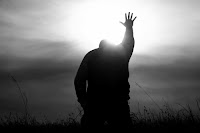I remember a year ago I was watching the last Rambo movie because my cousin told me it was awesome (for the record, it wasn't). Right before character creation and subtlety were jettisoned out of the airlock and replaced by scene after scene of ever-increasing violence, there was a brief moment of profundity. John Rambo, living in exile somewhere outside of Burma, is asked by a group of Christian missionaries if he would take them to their mission inside of Burma, despite the country being a "war-zone" (i.e., there's crazy people with guns running everywhere). Rambo grudgingly agrees to go and ferries them up river.
Somewhere along that magical ferry ride (after Rambo uses one pistol to kill no less than five bad guys at once), Rambo gets to talking with one of the missionaries. She asks him why he has been so grumpy about what they are doing. Rambo's response is interesting. Apparently, he thinks that the missionaries are all wasting their time. "You're going against what's natural," he says, referring to their pacifistic (and somewhat pretentious) brand of Christianity. "When you're pushed, killin's as easy as breathin'." Judging by the missionary's reaction, she saw his viewpoint as highly defeatist. I saw it as closer to the truth, but not quite.

The problem with the Christian missionaries in the film is their barely implicit denial of original sin (as well as their smugness about that denial). They seem to think that if they "turn the other cheek" by refusing to defend either themselves, their friends, or even the people that are under their care, then the crazy, genocidal militiamen will just throw down their arms and sing "Kumbaya". Or perhaps God will rain down fire upon them (which He sort of did, only the fire's name was Rambo). Of course, the exact opposite happens. Just as Rambo off-handedly predicted, the mission is sacked, the men killed (or taken off to be tortured), and the women raped. Rambo is unsurprised to hear this news, because he had taken and continues to take into account an important fact: the heart of fallen man is deceitful and desperately wicked (Jer. 17:9), and expecting sudden mercy and compassion from those who have let human depravity swallow them whole is a fool's dream.
There is a problem with Rambo's near-miss assessment, however, and it is in his use of the word "natural".
Oswald Chambers once said that if a man looks seriously at life, at the whole of existence as it really is, then he will find that it is fundamentally tragic rather than logical. Something is not right with the world, something that regularly and effectively upsets all our best-laid plans, hopes, and institutions. Something called Sin. It has wrecked us and the whole of creation with death and all its damnable incarnations. Since the Fall, it has been a part of our existence, a deep and interwoven part.

As deep a part as it may be, however, it is by no means "natural". It is easy to mistake it for such, but it is still not so. It may be commonplace and widespread, but that does not make it "natural". Despite ignorance to the contrary, Sin and death have been and always will be unnatural: abnormalities, deformities, aberrations, what ought not to be. Aberrations do not cease to be such simply because they are prevalent; a disease does not magically become health because it has taken over the whole body. Likewise, just because something is abundant enough to be called "common" does not in any way suddenly make it natural, normal, or moral.
This is a very ancient yet relevant fact. The creation is what it is; but whatever it is, it was not meant to be thus. There was a time before the Fall, where creation existed as it was intended to be, an existence it may yet be again. Until such time, however, we wander through the suffering waste and grim, where the saturation of aberration has become so complete that we stop noticing it. Furthermore, many without and even within the Christian camp would say that certain aberrations are actually natural and as God intended. This is how far the disease has spread: the body no longer sees it as such and instead welcomes it as health.

Rambo had taken into account the one great fact of life: the reality of sin. The problem is that there are two great facts of life, and the second is this: the reality of
redemption. Sin may be real, but it is
never "natural". There are no "natural" sins; all sin is unnatural. That is what the reality of redemption teaches us; and without that reality, sin is not only real but also all that there is. What's worse, its prevalence could become so accepted that no one calls it sin anymore. They call it "natural," normal, the way things are and thus ought to be. Without the reality of redemption, we have no motivation or means to pierce the darkness; we can only succumb either to despair or blindness, to a hopeless nihilism or an ignorant optimism. Rambo was the former. The Christian missionaries were the later.
The Christian Faith is neither.
-Jon Vowell (c) 2011



























































